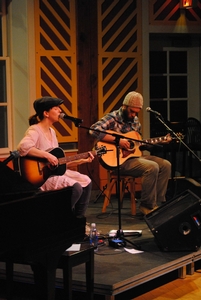Thomas and Weber falter at the Coffeehouse
by Taylor Coe '13
ARTS & ENTERTAINMENT EDITOR
Rosie Thomas’s Acoustic Coffeehouse performance last Thursday is neatly reflected in James Monger’s All Music review of her album If Songs Could Be Held, which shrewdly notes that Thomas’s music “wouldn’t sound out of place spilling from the ceiling of an extremely popular coffeehouse chain.” Not that this is necessarily negative; her music is smart and sad, but, as unkindly as it may sound, it could serve mostly as window decoration.
 Preceding Thomas was fledgling singer-songwriter Grace Weber, backed by her co-writer and pianist Julian Pollack. Awkward and unsure of what to do with her hands, Weber accompanied her trite lyrics with equally trite hand gestures—tossing a hand to the ceiling as she belted out a cliché about the moon. The temptation would be to offer her a guitar, but I’m not sure that’s the solution; she might end up rocking back and forth with every strum, the victim of a Nova Scotia sea shanty. The solution lies in staidness, in maybe putting her hands in her pockets.
Preceding Thomas was fledgling singer-songwriter Grace Weber, backed by her co-writer and pianist Julian Pollack. Awkward and unsure of what to do with her hands, Weber accompanied her trite lyrics with equally trite hand gestures—tossing a hand to the ceiling as she belted out a cliché about the moon. The temptation would be to offer her a guitar, but I’m not sure that’s the solution; she might end up rocking back and forth with every strum, the victim of a Nova Scotia sea shanty. The solution lies in staidness, in maybe putting her hands in her pockets.
Weber’s smooth voice ended up carrying the performance—but even tacking Pollack’s expressive piano arrangements onto her silky voice could not overcome the quality of her lyrics. Describing her songwriting process with Pollack, Weber said, “I’ll tell Julian to just play something on the piano and then I’ll start improvising to that and then words just start coming out just as the melody does.” Some artists pursue this more freeform pursuit of lyrics, but I am not sure it works for Weber.
Rosie Thomas, as aforementioned, was pleasant in comparison. She was no firecracker, but she had her moments. Her set, oddly enough, was saved through her inimitable sense of humor—complaining how closely New York City sometimes resembles Detroit and discussing her addiction to infomercials. But none of this humor evinced itself in the course of her music; her set-list was one sad love song after another with not so much as a passing funny detail.
The juxtaposition between humor and sadness was what made her set so uncomfortable to watch. I would not hesitate to vouch for the careful beauty of her singing voice, but everyone was left confused by the absurd squeakiness of her speaking voice. How such diametrically opposed sounds could emerge from the same throat remains a mystery to me. The difference was so marked that I could not help but wonder if the voice and accompanying humor was all an act.
Ultimately, the show remained exactly what it seemed to be: pleasant—but merely that. It had no moments of disgust, but it also had no moments of what I lightly term musical transcendence. Putting it simply, I felt rather bored.
